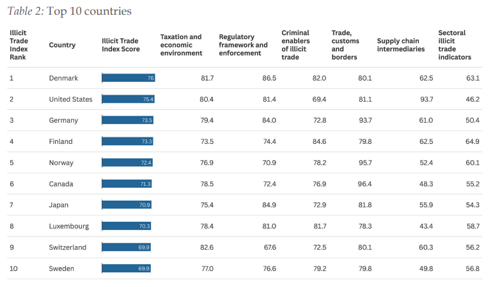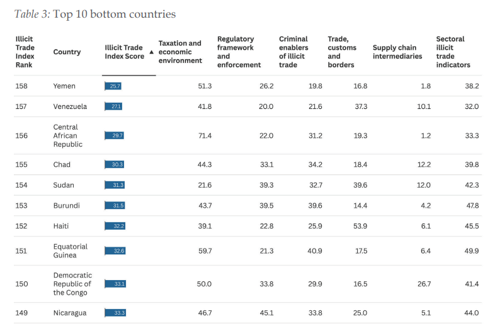
The 2025 Illicit Trade Index of 158 countries
03/04/2025
The 2025 Illicit Trade Index by the Transnational Alliance to Combat Illicit Trade (https://www.tracit.org/) provides a detailed analysis of how 158 countries are tackling various forms of illicit trade.
Here are some key insights from the Index:
- Country Rankings: The Index ranks countries based on their resilience against illicit trade, highlighting top and bottom performers.
- Evaluation Criteria: The Index assesses countries across six categories, including
- Taxation and economic environment,
- Regulatory framework and enforcement,
- Criminal enablers of illicit trade, trade,
- Customs and borders,
- Supply chain intermediaries, and
- Sectoral illicit trade indicators
- Sector Vulnerabilities: It identifies vulnerabilities across sectors such as counterfeit goods, illegal wildlife trade, illicit pharmaceuticals, and money laundering.
- Regional Analysis: Comparative analyses across regions and economic groupings like OECD, G20, BRICS, ASEAN, and the African Union.
- Policy Recommendations: The Index offers practical recommendations to strengthen policies, enhance enforcement, and promote international collaboration.
- Interactive Tools: Users can explore results through interactive visualization tools, including rankings, geographic and economic groupings, and radar charts.
Key Insights from the Index:
- Illicit Trade Is Widespread and Evolving –
- The global average score is just 49.9/100, showing most countries lack resilience.
- Even top performers like Denmark (76), the US (75.4), and Germany (73.5) have room for improvement.
- Low Scores, High Exposure
- Bottom-ranking countries, such as Yemen, Venezuela, and the Central African Republic, face conflict, weak governance, and porous borders, creating fertile ground for criminal networks.
- Digital Trade, Real Risks –
- E-commerce, postal networks, and Free Trade Zones (FTZs) remain weak spots.
- The average score for supply chain intermediary oversight is only 30.9/100, with postal security scoring just 3.8/100.
- Criminal Enablers & AML Weaknesses –
- Only 25 countries scored above 60 in controlling criminal enablers like money laundering, human trafficking, and corruption.
- Most fall short in anti-money laundering coordination.
- Sectoral Risks Underestimated –
- The lowest-performing area is enforcement against sector-specific illicit trade (e.g., fake medicines, agrochemicals, excise goods), with an average score of 44.6.
- No country scored above 66.4.
- Gaps in Interagency Coordination –
- Nearly 80% of countries lack a dedicated interagency anti-illicit trade task force, weakening the national response to organized criminal threats.


Why This Matters for AML & Compliance Professionals
Illicit trade not only fuels criminal economies—it erodes tax systems, undermines consumer trust, and finances organized crime. Financial institutions must:
- Enhance due diligence on high-risk jurisdictions and sectors.
- Strengthen controls around e-commerce, FTZs, and postal flows.
- Align with international AML standards and improve interagency cooperation.
- Support cross-border data sharing and policy harmonization.
This comprehensive framework aims to help policymakers and industry leaders fortify defences, improve regulatory frameworks, and disrupt illicit trade networks.
References
The Team
Meet the team of industry experts behind Comsure
Find out moreLatest News
Keep up to date with the very latest news from Comsure
Find out moreGallery
View our latest imagery from our news and work
Find out moreContact
Think we can help you and your business? Chat to us today
Get In TouchNews Disclaimer
As well as owning and publishing Comsure's copyrighted works, Comsure wishes to use the copyright-protected works of others. To do so, Comsure is applying for exemptions in the UK copyright law. There are certain very specific situations where Comsure is permitted to do so without seeking permission from the owner. These exemptions are in the copyright sections of the Copyright, Designs and Patents Act 1988 (as amended)[www.gov.UK/government/publications/copyright-acts-and-related-laws]. Many situations allow for Comsure to apply for exemptions. These include 1] Non-commercial research and private study, 2] Criticism, review and reporting of current events, 3] the copying of works in any medium as long as the use is to illustrate a point. 4] no posting is for commercial purposes [payment]. (for a full list of exemptions, please read here www.gov.uk/guidance/exceptions-to-copyright]. Concerning the exceptions, Comsure will acknowledge the work of the source author by providing a link to the source material. Comsure claims no ownership of non-Comsure content. The non-Comsure articles posted on the Comsure website are deemed important, relevant, and newsworthy to a Comsure audience (e.g. regulated financial services and professional firms [DNFSBs]). Comsure does not wish to take any credit for the publication, and the publication can be read in full in its original form if you click the articles link that always accompanies the news item. Also, Comsure does not seek any payment for highlighting these important articles. If you want any article removed, Comsure will automatically do so on a reasonable request if you email info@comsuregroup.com.


